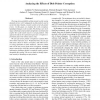Free Online Productivity Tools
i2Speak
i2Symbol
i2OCR
iTex2Img
iWeb2Print
iWeb2Shot
i2Type
iPdf2Split
iPdf2Merge
i2Bopomofo
i2Arabic
i2Style
i2Image
i2PDF
iLatex2Rtf
Sci2ools
106
Voted
DSN
2008
IEEE
2008
IEEE
Analyzing the effects of disk-pointer corruption
The long-term availability of data stored in a file system depends on how well it safeguards on-disk pointers used to access the data. Ideally, a system would correct all pointer errors. In this paper, we examine how well corruptionhandling techniques work in reality. We develop a new technique called type-aware pointer corruption to systematically explore how a file system reacts to corrupt pointers. This approach reduces the exploration space for corruption experiments and works without source code. We use type-aware pointer corruption to examine Windows NTFS and Linux ext3. We find that they rely on type and sanity checks to detect corruption, and NTFS recovers using replication in some instances. However, NTFS and ext3 do not recover from most corruptions, including many scenarios for which they possess sufficient redundant information, leading to further corruption, crashes, and unmountable file systems. We use our study to identify important lessons for handling corrupt poi...
Computer Networks | Corrupt Pointers | DSN 2008 | On-disk Pointers | Type-aware Pointer Corruption |
Related Content
| Added | 29 May 2010 |
| Updated | 29 May 2010 |
| Type | Conference |
| Year | 2008 |
| Where | DSN |
| Authors | Lakshmi N. Bairavasundaram, Meenali Rungta, Nitin Agrawal, Andrea C. Arpaci-Dusseau, Remzi H. Arpaci-Dusseau, Michael M. Swift |
Comments (0)

